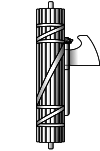Integral nationalism
| Part of a series on |
| Nationalism |
|---|
|
Core values |
|
Organizations |
| Politics portal |
| Part of a series on |
| Fascism |
|---|
 |
|
Organizations |
|
Lists |
|
Integral nationalism is a type of nationalism[1][2][3] opposed to risorgimento nationalism. Whereas risorgimento nationalism applies to a nation seeking to establish a liberal state (for example the Risorgimento in Italy and similar movements in Greece, Germany, Poland, Japan in the 19th century or civic nationalism e.g. American nationalism), integral nationalism results after a nation has achieved independence and has already established a state. Nazi Germany and Fascist Italy, according to Alter and Brown, were examples of integral nationalism. Some of the qualities that characterise integral nationalism are anti-individualism, statism (plans by the few ideology), radical extremism, and aggressive expansionist militarism.
Integral nationalism arises in countries where a strong military ethos has become entrenched through the independence struggle, when, once independence is achieved, it is believed that a strong military is required to ensure the security and viability of the new state. Also, the success of such a liberation struggle results in feelings of national superiority that may lead to extreme nationalism.
Integral states are totalitarian and the government or state dominates all aspects of society. Mussolini's Italy can be the first example of such a society. Integral nationalism often overlaps in places with fascism.
Integral nationalism derives from the nationalisme intégral of the French nationalist author Charles Maurras, who stated: "A true nationalist places his country above everything".
See also
References
- ↑ https://books.google.com/books?id=ruiGAgAAQBAJ&pg=PA66&lpg=PA66&dq=Peter+Alter++Risorgimento&source=bl&ots=OepZzAHUMT&sig=0fK_FXIqdUZBp5QVrxVmYFjIwbc&hl=it&sa=X&ei=BJpkVPTVJsH-ygPki4CYBw&ved=0CCIQ6AEwAQ
- ↑ More recently, Peter Alter discussed integral nationalism in his book "Nationalismus" (1985)
- ↑ Integral nationalism is one of five types of nationalism defined by Carlton Hayes in his 1928 book The Historical Evolution of Modern Nationalism.